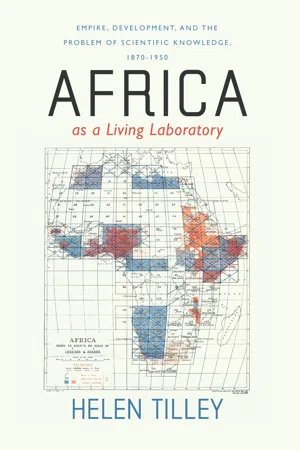![]()
NOTES
INTRODUCTION
1. See Dubow, “A Commonwealth of Science,” 67–99; and Worboys, “The British Association and Empire.” Additional details are derived from the London Times and the National Archives of Kenya and Britain.
2. Hofmeyr, “Africa and Science,” 11, 18.
3. Ibid., 13–14.
4. Ibid., 13.
5. Ibid., 17.
6. Ibid., 19–21.
7. See Lord Lothian’s foreword in Hailey, An African Survey, v.
8. For evidence, see Hailey, An African Survey, 1956 rev. ed.; Scientific Council for Africa South of the Sahara, Inter-African Technical and Scientific Co-Operation; Scientific Council for Africa South of the Sahara, Eighth Meeting of the Scientific Council; and Worthington, Science in the Development of Africa.
9. In their volume on the pertinence of Antonio Gramsci’s concept of hegemony to colonial settings in India and Africa, Dagmar Engels and Shula Marks stipulate that hegemony “suggests the ways in which colonial ideology served the ruling class by helping it to make their rule appear natural and legitimate; . . . hegemonic colonial ideologies reflected the material and cultural conditions of both the dominant and dominated classes. To be successful, imperial hegemony had to come to terms with, incorporate and transform Indian and African values.” Engels and Marks, Contesting Colonial Hegemony, 3.
10. Hailey, An African Survey, xxiv–xv, emphasis added.
11. For a lengthier definition, see Thackray, “History of Science,” 4–5.
12. Here I list the name of the independent country first and the name of the colonial dependency, if it was different, in parentheses; in the rest of the book, I use only the historical designations.
13. Weindling, “Social Medicine at the League of Nations Health Organisation,” 134–53, esp. 136–37.
14. Drayton, “Science, Medicine, and the British Empire,” 264.
15. Huxley, Africa View, 378–79.
16. Crawford, Shinn, and Sörlin, “The Nationalization and Denationalization of the Sciences,” 2.
17. Schroeder-Gudehus, “Nationalism and Internationalism,” 909.
18. See also Sörlin, “National and International Aspects of Cross-Boundary Science,” and Jamison, “National Political Cultures and the Exchange of Knowledge”; Chambers, “Period and Process in Colonial and National Science,” and Sheets-Pyenson, “Civilizing by Nature’s Example”; and Crane, “Transnational Networks in Basic Science.”
19. This phrase is used not only by historians but also by sociologists, anthropologists, and critics of development.
20. Cohn, Colonialism and Its Forms of Knowledge; Marks, “What Is Colonial about Colonial Medicine?”
21. The classic statement is Basalla, “The Spread of Western Science.” Use of this phrase is not limited to Africanists. In the 2005 special issue of Isis on “Colonial Science,” contributors use the phrase but often adroitly sidestep many of its limitations. See also Cañizares-Esguerra, Nature, Empire, and Nation; Philip, “English Mud”; Osborne, “Acclimatizing the World”; Chambers and Gillispie, “Locality in the History of Science”; Conte, “Colonial Science and Ecological Change”; Gilfoyle, “Veterinary Immunology as Colonial Science”; Raina, “Beyond the Diffusionist History of Colonial Science”; and Kumar, “Patterns of Colonial Science in India.”
22. A number of authors writing on science and empire have avoided this phrase, including Roy MacLeod, David Livingstone, and Warwick Anderson.
23. I am leaving “science” in the singular here, but readers should bear in mind that we are talking about sciences in the plural. See Livingstone, “The Spaces of Knowledge”; and Shapin, “Placing the View from Nowhere.”
24. See Ferguson, Global Shadows.
25. One of the most interesting statements on the lack of a “system” of knowledge is Last, “The Importance of Knowing about Not Knowing.”
26. See Headrick, The Tentacles of Progress. Headrick does not discuss the introduction of the airplane, which began to feature with some regularity in British colonial scientific circles by the interwar period.
27. On other colonial regions and periods, see Cañizares-Esguerra, Nature, Empire, and Nation; Ballantyne, Science, Empire, and the European Exploration of the Pacific; Arnold, Science, Technology, and Medicine in Colonial India; Drayton, Nature’s Government; MacLeod and Rehbock, Darwin’s Laboratory; McClellan, Colonialism and Science; Pyenson, Empire of Reason; Pyenson, Civilizing Mission; Burnett, Masters of All They Surveyed; Edney, Mapping an Empire; Miller and Reill, Visions of Empire; and Grove, Green Imperialism.
28. I must set aside the question of precolonial Islamic sciences, though it would repay closer examination.
29. On northern Africa, see Keller, Colonial Madness; El Shakry, The Great Social Laboratory; Pelis, Charles Nicolle, Pasteur’s Imperial Missionary; Osborne, Nature, the Exotic and the Science of French Colonialism; Jagailloux, La medicalisation de l’Egypt; Gallagher, Medicine and Power in Tunisia; and Gallagher, Egypt’s Other Wars. Two recent books on southern Africa illuminate trends there: Dubow, A Commonwealth of Knowledge, and Harries, Butterflies and Barbarians. The concept of a “center of calculation” comes from Latour, Science in Action.
30. See Collins, “The British Association as Public Apologist for Science”; Adas, Machines as the Measure of Men; MacLeod and MacLeod, “The Social Relations of Science and Technology”; Owen, “Critics of Empire in Britain”; Wylie, “Norman Leys and McGregor Ross”; Louis, Imperialism at Bay; and Constantine, The Making of British Colonial Development Policy.
31. For more on these themes, see MacLeod, Nature and Empire; Bonneuil, “Mettre en ordre et discipliner les tropiques”; Carroll, “Engineering Ireland”; Smith and Agar, Making Space for Science; Wright, “Tradition in the Service of Modernity”; Livingstone, “The Spaces of Knowledge”; Kuklick and Kohler, Science in the F...
